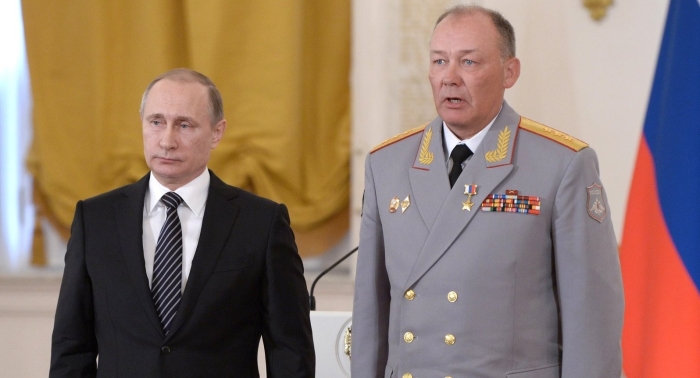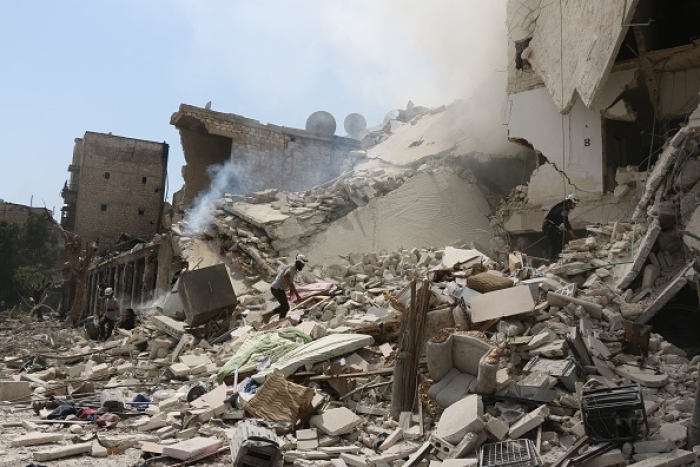
Gen. Aleksandr Dvornikov with Russian President Vladimir Putin at a medal award ceremony at the Kremlin in 2016. Putin awarded him the title of ‘Hero of the Russian Federation.’ (Photo: The Kremlin)
(CNSNews.com) – Russian President Vladimir Putin has placed in charge of the invasion of Ukraine an army general notorious for ruthless actions in support of the Assad regime in Syria, prompting concerns that the conflict could become even more brutal.
Gen. Aleksandr Dvornikov’s appointment to the task has already been linked to a missile strike Friday on a railway station in eastern Ukraine where several thousand people trying to flee the region ahead of the Russian forces were waiting to evacuate. More than 50 people, including children, were killed in the attack in Kramatorsk.
The general led the Russian military effort to prop up Syrian President Bashar Assad in 2015-2016 before being promoted to command the Russian military district that covers the North Caucasus as well as Russian-occupied Crimea.
In the Syrian campaign, Russian and Assad regime operations against the rebel-held eastern city of Aleppo included the use of incendiary and cluster munitions in the bombing of civilian areas and facilities, including hospitals. Putin in 2016 awarded him the title of “Hero of the Russian Federation.”
“You have a new commander [in the Ukraine invasion]. You have General Dvornikov,” David Petraeus, former CIA director and commander of U.S. Central Command, said on CNN’s “State of the Union” on Sunday.
“He is known as the ‘butcher of Syria’ for this brutal campaign that he prosecuted in Syria when he was the commander there in 2016.”
Host Jake Tapper asked Petraeus if Dvornikov’s appointment meant there would even more targeting of civilians.
“I fear that it may,” he said. “Again, the Russians were known in Syria basically for – quote – ‘depopulating’ areas. That’s what they did to Aleppo. That’s what they did to other areas.”
“And I think we can expect that. We saw the very first operation taken under him includes that terrible strike on the rail station.”
With the Russians having pulled back from the failed attempt to capture Kyiv to focus on the Donbas region in the southeast, Petraeus said they likely hope to succeed there by May 9, the day Russia marks victory in World War II.
“The hallmark of the Russian forces so far has been indiscipline, not discipline,” Petraeus said. “It has been violation of the Geneva Convention and the law of land warfare and so forth. We have seen repeated evidence of that.”
“And that’s what we’re going to see more of, I fear, in the days and weeks that lie ahead.”
“So, we got to do everything we can to provide everything as quickly as possible,” he added, in reference to military weapons and equipment Ukraine is asking for.
National Security Advisor Jake Sullivan said on the same program that no appointment of a general to oversee the war “can erase the fact that Russia has already faced a strategic failure in Ukraine.”
But he also acknowledged Dvornikov’s controversial record.
“This particular general has a resume that includes a brutality against civilians in other theaters, in Syria. And we can expect more of the same in this theater,” he said.
“This general will just be another author of crimes and brutality against Ukrainian civilians,” Sullivan said. “And the United States, as I said before, is determined to do all that we can to support the Ukrainians as they resist him and they resist the forces that he commands.”

Devastation in Aleppo, Syria caused by Russian and Assad regime bombing in 2016. (Photo by Thaer Mohammed/AFP via Getty Images)
Dvornikov has been sanctioned by the British government since 2019, for actions in support of “the consolidation of the illegal annexation of the Crimean Peninsula into the Russian Federation, which in turn further undermines the territorial integrity of Ukraine.”
‘Cruel and criminal and wrong and evil’
Russia’s defense and foreign ministries denied responsibility for Friday’s deadly missile strike on the Kramatorsk train station, charging that Ukrainian armed forces were to blame.
“Obviously, we are not buying the denial by the Russians that they weren’t responsible,” said a senior Pentagon official briefing on background.
“I would note that they originally claimed a successful strike, and then only retracted it when there were reports of civilian casualties,” the official said. “So it’s our full expectation that this was a Russian strike.”
As of Friday, the U.N. human rights office in Geneva said it had recorded 1,793 Ukrainian civilians killed and 2,439 injured in the six-week war, with most casualties caused by shelling, missiles, and in air strikes. As before, it said the actual figures are believed to be considerably higher.
When Putin on February 24 announced the invasion he said the goal was to “strive for the demilitarization and denazification of Ukraine” and to bring to justice those who he claimed that committed crimes against civilians, including Russian citizens, in the Donbas.
The invasion has been widely assessed as not having gone according to plan, running into unexpectedly Ukrainian resistance.
As Russian forces late last month withdrew from areas around the capital – for what the Pentagon said appeared to be a refocusing on the Donbas region – evidence of widespread deliberate killings of civilians began to emerge along with the discovery of mass graves.
Tapper asked Sullivan on Sunday if the Russian forces were committing genocide.
“In my opinion, the label is less important than the fact that these acts are cruel and criminal and wrong and evil and need to be responded to decisively,” Sullivan replied. “And that is what we are doing.”
“And we’re doing that not just by supporting international investigations and gathering evidence to hold the perpetrators all the way to the highest levels accountable,” he said. “We’re doing it by providing sophisticated weapons to the Ukrainians that are making a major difference on the battlefield.”
Genocide is defined in international law as the intent to destroy a national, ethnic, racial or religious group, accompanied by atrocities aimed at achieving that goal.





More Stories
Design Considerations for Hermetic Feedthrough in Industrial Systems
Things you must know before becoming an insurance agent
Expert Professional Services Tailored to Your Unique Needs